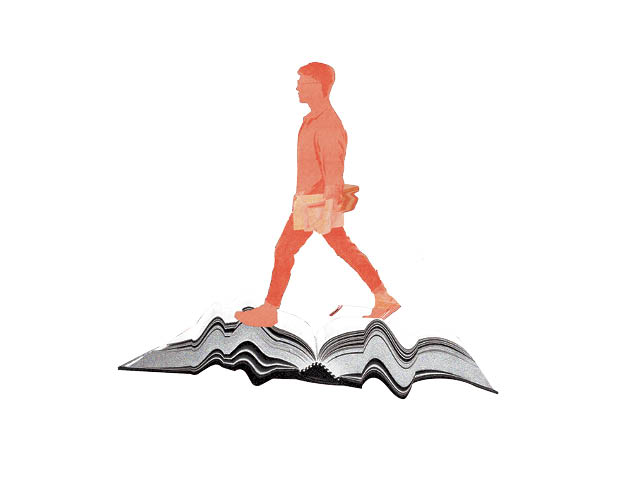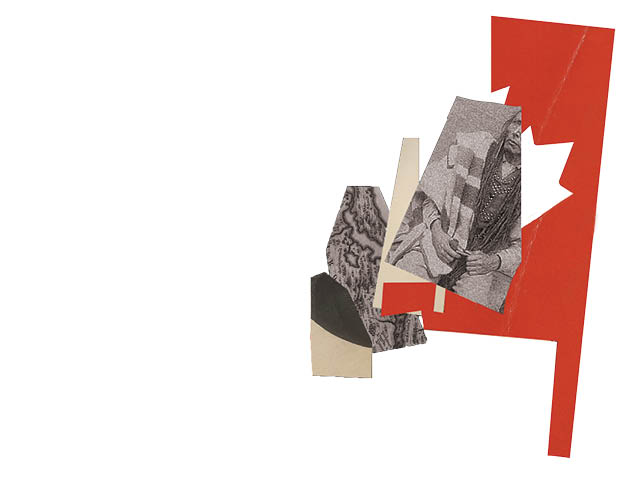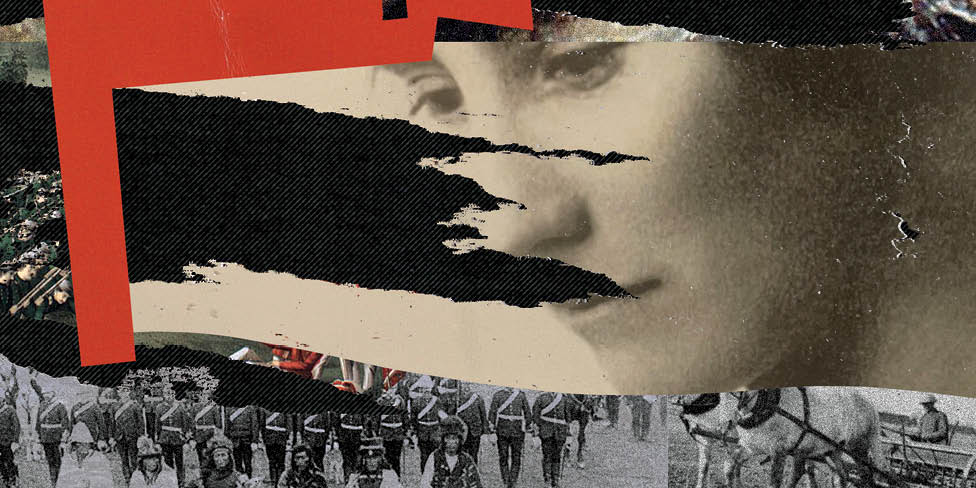As Western universities began their rise almost a millennium ago, there was no question as to which area of study was the “Queen of Sciences.” And as theology began its slow slide into relative obscurity — not just in the life of the mind but as a crucial stepping stone along the path to a prosperous career — it’s easy to imagine theologians in their common rooms debating the causes, the losses incurred, the villains responsible and possible counter measures. Just like liberal arts faculties across the Anglosphere in the wake of a decade-plus of declining interest, as measured by university humanities enrolments, in human as opposed to divine affairs. This being Canada at the tail end of the 25th anniversary of Jack Granatstein’s Who Killed Canadian History?, the Fort Sumter of the national history-culture wars, no button burns hotter, within or without the academy, than history, and more specifically Canadian history.
The plain facts are clear, even if their meaning is not. As Alex Usher’s Higher Education Strategy Associates blog has continuously shown, from a peak enrolment in 2010-2011, humanities enrolment at Canadian universities cratered year after year until flattening out in 2016, at a level where it has remained. The steepest fall was in what Mr. Usher calls the “narrative” humanities, literature (French or English) and history, as opposed to the other two large clusters, language/linguistics and philosophy. The STEM, health and business enrolments, which have been growing through the 21st century, have boomed even while history majors have declined 35 per cent from more than 15,000 to around 10,000.
Graduate students in history are harder to track but seem correspondingly scarce. At the University of Victoria, where the history department welcomed 23 grad students in 2010, history professor Penny Bryden notes it admitted just 10 this year. The drop in admissions is not only because there were fewer applications — 77 at UVic in 2010 versus 52 last year. There are also fewer faculty in many history departments because departures have not been replaced as student enrolment declined. For example, the University of Alberta’s history department has seen a 40 per cent drop in faculty positions over the last 15 years, according to Ryan Dunch, chair of the history and classics department. There is less funding than there was in the past as well, says Dr. Bryden: Ten grads were “all we could afford.”
“We won’t have PhDs who specialize in Canadian economic, political and military history … This is a huge threat to national identity and, ultimately, national unity.”
Writing on the Active History website, Dalhousie University historian Will Langford, a member of the Canadian Historical Association (CHA)’s task force on the future of the history PhD in Canada, notes that completed doctoral dissertations averaged 100 a year from 2016 to 2020, before dropping precipitously during the next two pandemic years. It is likely, Dr. Langford argues, that lockdown restrictions on travel and archival access accounted for most of the decline. However, research into falling PhD program enrolments by fellow task force member Catherine Carstairs at the University of Guelph also indicates the annual numbers won’t bounce back to 100. There are fewer doctoral students than before, says Mark Bourrie, lawyer, historian and author of Bush Runner, an award-winning biography of Pierre-Esprit Radisson, because he believes “the universities stopped hiring tenure-track people years ago, especially Canadianists, and now the best a [humanities] PhD grad can hope for is a chance to teach some courses as a sessional lecturer.”
While that may be why fewer grads opt to take the narrowing pathway to teaching history, the reason there are fewer in a position to decide on that at all is because of the shrinkage in undergraduate majors. There is general agreement among interested parties that the latter is rooted in similar trends — educational, economic, social and demographic — and that’s where the agreement ends and fissures appear.
For some, mostly advance degree holders not involved in history departments, the resulting situation is a profound problem, rooted as much in insufficient and poor history instruction at the primary and secondary levels as it is in anything else. In The Vanishing Past, Trilby Kent’s engaging and informative 2020 plea for more narrative and factual content in K to 12 history teaching, she points out how “in Ontario, history went from accounting for 11.4 per cent of all classes in 1964 to a mere 6.6 per cent in 1982.” She argues that social history, on the rise since the 1970’s, hasn’t just squeezed out older forms (political and economic) but has shown an inclination to fragmentation and sectarianism, forces antithetical to the sort of story that draws children to history.

Paul W. Bennett, adjunct professor of education at Saint Mary’s University, emphasizes that history is the liberal art with the most strenuous reading requirements, a barrier to student entry in a society turning ever more visually oriented: “I think history courses became less attractive by virtue of the fact that they’re much more challenging.” Contributors taking part in a 25th anniversary commemoration of Dr. Granatstein’s work, presented late last year by online news site The Hub, wrote inter alia about how historians obsessed with regional, class, gender and ethnic identities were shattering what collective sense of national community Canadians still possess, and how Dr. Granatstein was too optimistic in his fear that a unified narrative might ebb away.
“I can’t conceive how, 15 or 20 years from now, you are going to explain Canada to people?,” says Dr. Bennett. “It will be inexplicable in the versions that are coming up. They’re just not communicable to a larger audience.” For Trent University Canadian studies professor Christopher Dummitt, the near-future received history of Canada will not be so much inexplicable as overwhelmingly negative – the story of an illegitimate “settler colonial nation, steeped in a racist history.” The new national narrative will have no trace “of the fact that there really was a Canadian story amidst all this [oppressed] diversity,” he says.
“Canada will not be so much inexplicable as overwhelmingly negative, the story of an illegitimate “settler colonial nation, steeped in a racist history.”
Either way, adds Dr. Bourrie, within a generation or two, “we won’t have PhDs who specialize in Canadian economic, political and military history. We already have almost no one who has done work on the history of the provinces. This is a huge threat to national identity and, ultimately, national unity.”
However, for some inside the ivory tower, all of this is seen as exaggerated at best and flat-out wrong at worst. Carla Peck, a professor of social studies education at the University of Alberta, is in the fifth year of leading a seven-year study called “Thinking Historically for Canada’s Future,” the first study to consider K to 12 history education in Canada since 1968. “This is the largest grant program that SSHRC has outside of things like Canada Research Chairs, and my team of 30 other researchers includes historians as well as people working in faculties of education,” Dr. Peck says. The goal is “to understand how a critical historical thinking approach to teaching and learning history — and by critical I mean analytical, not finding something wrong with everything — can support the development of critically minded citizens. Ever since history became a school subject, its rationale has been, ‘teach more history, get better citizens,’ and yes content is as crucial as learning how historical knowledge is produced. You can’t teach historical thinking concepts without historical content.”
At UVic, Dr. Bryden, a former president of the CHA and a scholar whose focus is on modern Canadian political and constitutional history, faintly echoes Dr. Bourrie by noting her department does not currently offer a course on the history of British Columbia. But when it comes to political and diplomacy/military history, the perceived death of which disturbs critics, “I still teach a lot of that and I still get lots of students.”
And Dr. Bryden agrees that the apparent reduction in history teaching is at least partially a matter of terminology. Much is taught in K to 12 under the rubric of social studies, and even at universities “it’s masquerading as other things at the moment,” he says. “I think Canadian history is lurking in courses that don’t call themselves ‘Canada Since 1867,’ but are about particular themes — the environment or climate change, for example — that are almost exclusively Canadian because that’s where we are. So I don’t think there’s been as big or as dramatic a death as some proclaim.”
In another Active History article posted in January, Thomas Peace argues that no one killed Canadian history, and it’s the history wars that should die. The aptly named Huron University College associate professor of history does not declare victory for his “side,” but offers an olive branch to all other perspectives in an acerbic dispute, arguing that there’s a desperate need for historians to unite because they have a common and serious problem to confront: “the dominance of job-ready training (as opposed to more formative types of education).”
“We have a hard time equating our degree with a job, and we’ve lost the narrative that says that a university degree prepares you not for a job but for life as a member of a community.”
That social trend certainly looms large for anyone who thinks the history wars may be much ado about nothing. HESA’s Mr. Usher, the child of two historians, points out that humanities enrolments have cratered since the wake of the financial crisis of 2008, but the fall has only taken them back to where they were around 2000, “and we had a functioning humanities system then.” Do historians (and English professors) think their disciplines are flailing in the depths mainly because they reached unprecedented modern heights in 2010?
That raises the question of just how much of their own expertise historians are applying to the history of historical instruction? If the fate of theologians after Europe’s “Wars of Religion” seems a parallel too far, they could consider the evolution of history curricula. In 1920, at the U of A two years after the Great War — one of the most significant periods in the evolution of modern Canada — there were eight courses offered to undergraduates by the department of history.
The first, called General History, covered Western Europe from the Renaissance to “the present day.” Next came two British history courses (the dividing year was 1485), followed by three European history courses, an English constitutional history and, finally, a single Canadian history course (from New France on). Strike out “Canadian” and replace it with the appropriate Dominion, and an essentially identical calendar was probably in use at institutions in Australia and New Zealand — unless their universities were quicker to catch up with burgeoning post-war nationalism than the U of A was.
In the century since, a concentration on national history replaced the imperial version even while continuously breaking off into constituent parts — political, economic, labour, gender et al. Contemporary student interest seems to lie in history that is less national than local (community/personal identity) or global (environmental, colonial and decolonial) or simultaneously both, as Dr. Bryden said about climate change history. In recent years the U of A has offered courses on drugs in modern global history and on plague, diseases and epidemics. “Those are courses that enroll 120 students,” Dr. Dunch says, “and they usually fill.” And there is positive news to report: “We went from 350 majors in 2010 to about 200 in 2015,” says Dunch, “but we have been building that back up and are now at about 255.”

Those are the sort of history courses that make inroads — as far as any humanities courses do — with both Canadian-born undergrads and the rapidly growing demographic of international students who now form almost 20 per cent of postsecondary enrolment in Canada. Dr. Dunch, a Chinese history specialist, often has Chinese students pursuing business or STEM majors in his classes. At the University of Toronto’s Rotman School of Management, L.R. Wilson/R.J. Currie Chair in Canadian Business History Dimitry Anastakis, one of the very few Canadian historians cross-appointed to a business school, says half the students enrolled at Rotman are international. They make up the majority of his elective, a second-year MBA class on the history of Canadian business and it always has a waiting list because “they have this amazing thirst for learning about Canada and its history,” he says.
Mr. Usher agrees – the university student of today doesn’t look like the university student of 2010, which doesn’t bode well for the humanities. “A far higher proportion are international or first- or second-generation visible minority Canadian, and they don’t study the same things Canadians did before.” Whether they’re international and paying four times the tuition charged Canadians — a massive revenue stream for universities that has helped keep them afloat in the face of declining government funding — or Canadian citizens, they tend to be laser-focused on STEM or business degrees.
That’s an alarming and depressing trend for many humanities academics. “We have a hard time equating our degree with a job,” says Dr. Bryden, “and we’ve lost the narrative that says that a university degree prepares you not for a job but for life as a member of a community, a participant in the collective commons. As a result, we kind of lost our reason for being.” Others are in more of a state of fury: “There’s lots of work outside academia for people with degrees in subjects like history,” says Dr. Bourrie. “With second-language training, there’s work in the public service. There’s research work, which is expanding quickly, high school teaching, political staff work, even professional writing. I got into law school on my grades — even though I was 56 when I applied — because I had great marks in history.”
“Universities stopped hiring tenure-track people years ago, especially Canadianists, and now the best a PhD grad can hope for is a chance to teach some courses as a sessional lecturer.”
But humanities departments do not market career opportunities as much as other departments do, Dr. Bourrie says. Recent U of T history graduate Victoire MacNaughton is in full agreement, pointing out the general dearth of internships, regular meetings with successful alumni, or other concrete indications that humanities departments realize students have economic as well as intellectual interests. Mr. Usher has what he calls a general theory about the humanities, which is that they sell themselves incredibly badly. “They don’t do outreach to high schools by and large, while STEM faculty are in high schools all the time. Just ask any arts dean who are the top five employers of their graduates. Typically they don’t know, which makes me think the question actually is, why don’t they know?”
And this is despite the fact that there are, Mr. Usher argues, “fantastic stories to be told about the many things you can do in arts and humanities. [HESA] did a project on this seven, eight years ago when the numbers were still falling, trying to imagine how to market humanities. One really simple idea was a spy camp for 12- to 14-year-olds where they’d solve humanities-based puzzles, around language for instance, or coding and documents. If you think about it, document examination is what a lot of humanities is. There are many ways you can make humanities fun and appealing to young people.”
If all that pertains to what can be called non-academic jobs for historians qua historians, it’s worth noting that the business world is just as muted in its support. Corporate Canada and business philanthropists do value historical knowledge and training, especially the critical thinking skills fostered by the latter. Finding the financial support for the endowed chair in business history now held by Dr. Anastakis was “the easiest $3 million I ever raised,” says fellow Rotman professor Joe Martin: “two donors of $1 million each, three others of a quarter of a million.” Nonetheless, a history course is not mandated for MBA students at Rotman the way it is at Harvard Business School — history has its place, no more and no less — and “humanities majors welcome” is not a neon-lit message in corporate hiring.
Historical study and historical expertise offer much to individuals and economic entities alike. But not the immediate allure of “job-ready” accreditation. As long as we live in a commercial society, the humanities will have to demonstrate to funders and — pardon the phrase — potential consumers alike, that they deliver economic as well purely educational benefits. They are going to have to market the value of history.

UNB currently has 4 PhDs working on Canadian First World War history, two more on national histories taking place during the FWW and another working on Atlantic Canada. but it takes about 5-6 years full-time to earn that. Who wants to commit to that much time when post PhD positions in history are lacking. You can become a doctor in half the time or do an Engineer or Computer Science Masters and PhD in 4 years. To be competitive post PhD, you have to do mandatory courses, elective courses, comprehensive fields, language requirement, teaching practicum, research assistantship, thesis research and then write the dang thesis. I think the Great Recession drove home the point to many parents that “practical” or professional degrees were a less risky option. I know my wife questions my sanity about doing all the work for a PhD in history.